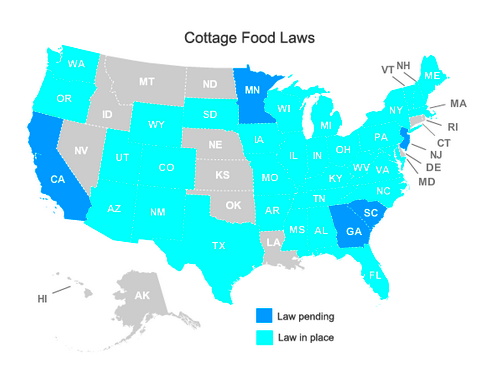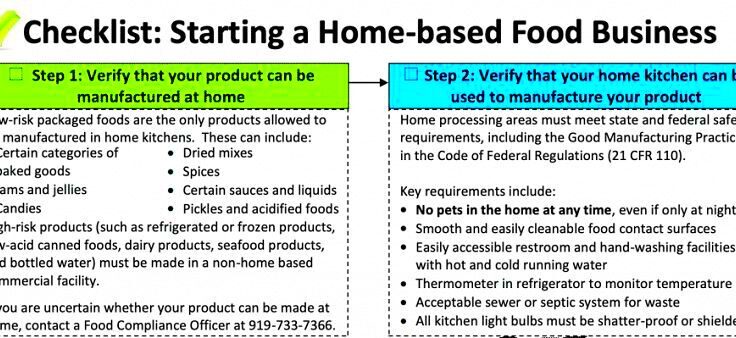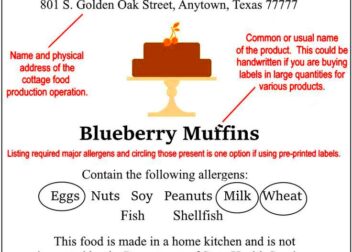Cottage Food Laws in North Carolina Explained
Cottage food laws are essential for individuals looking to turn their cooking passions into a small business. These laws allow home-based food entrepreneurs to produce and sell certain foods from their own kitchens. In North Carolina, these regulations are designed to support local food businesses while ensuring consumer safety. Understanding these laws can help aspiring food makers navigate the rules and requirements for selling their delicious creations.
Overview of North Carolina Cottage Food Laws

North Carolina’s cottage food laws were enacted to promote small-scale food production while ensuring that food safety standards are met. Here are some key points about these laws:
- Definition: Cottage food laws permit individuals to prepare and sell specific types of food from their homes.
- Registration: Producers must register their business with the North Carolina Department of Agriculture and Consumer Services (NCDA&CS).
- Sales Limitations: There is typically a sales cap that limits the total annual revenue a cottage food producer can earn.
- Permitted Locations: Cottage food products can be sold at farmers’ markets, roadside stands, and online, but not in retail stores or restaurants.
These laws aim to strike a balance between encouraging entrepreneurship and protecting public health by requiring producers to adhere to safety guidelines.
Types of Foods Allowed Under Cottage Food Laws
Not all food items can be sold under North Carolina’s cottage food laws. The following categories of foods are typically permitted:
- Non-Hazardous Foods: Foods that do not require refrigeration and have a low risk of foodborne illness.
- Baked Goods: Items like cookies, cakes, and breads that can be safely made at home.
- Preserved Foods: Jams, jellies, and preserves that meet safety standards.
- Dried Herbs and Seasonings: Homemade spice blends and dried herb mixes.
- Candies and Confections: Sweet treats like fudge and chocolates that do not require refrigeration.
It is important for producers to stay updated on the specific guidelines and any changes to the laws to ensure compliance.
Requirements for Cottage Food Producers
To become a cottage food producer in North Carolina, you need to meet specific requirements. These ensure that the food you sell is safe for consumers. Here’s a breakdown of the main requirements:
- Age Requirement: You must be at least 18 years old to register as a cottage food producer.
- Food Safety Training: Completing a food safety course is highly recommended. This training can help you understand safe food handling practices.
- Registration: You must register your cottage food business with the North Carolina Department of Agriculture and Consumer Services (NCDA&CS). Registration typically includes submitting a form and paying a fee.
- Home Kitchen Inspection: Your home kitchen does not require an inspection, but you must adhere to cleanliness and safety standards while preparing food.
- Product Limitations: Only specific types of foods are allowed under cottage food laws. Ensure your products fit within these guidelines.
Meeting these requirements is crucial not only for legal compliance but also for building trust with your customers. A commitment to quality and safety can go a long way in establishing a successful cottage food business.
Labeling Requirements for Cottage Food Products
Labeling is a vital part of selling cottage food products in North Carolina. Proper labels not only inform customers about what they are purchasing but also comply with state regulations. Here’s what you need to include on your labels:
- Product Name: Clearly state the name of the product.
- Ingredients List: List all ingredients in descending order by weight. This helps customers with allergies make informed choices.
- Net Weight or Volume: Indicate the amount of the product in the package.
- Producer Information: Include your name and address. This ensures customers know who made the product.
- Allergen Information: If your product contains common allergens like nuts or gluten, it’s essential to highlight this information.
- Disclaimer: A statement saying, “Made in a home kitchen” or similar wording is required to inform consumers that the product is homemade.
Proper labeling helps protect consumers and allows you to market your products effectively. Always double-check that your labels meet state requirements to avoid any issues.
How to Sell Cottage Food in North Carolina
Once you’re ready to sell your cottage food products, knowing the best avenues for sales can help you reach your customers effectively. Here are some practical ways to sell your cottage food in North Carolina:
- Farmers’ Markets: Setting up a booth at local farmers’ markets is a fantastic way to connect with customers. These markets attract people looking for fresh, homemade goods.
- Online Sales: You can sell your products online through social media platforms or your own website. Just ensure you comply with shipping regulations for food items.
- Community Events: Participate in local fairs, festivals, or community events where you can showcase and sell your products.
- Home Delivery: Offer home delivery services within your local area. This can attract customers who prefer convenience.
- Word of Mouth: Don’t underestimate the power of word of mouth. Encourage satisfied customers to spread the word about your products.
As you start selling, remember to engage with your customers. Gather feedback, build relationships, and continuously improve your offerings. This approach will not only help you grow your business but also foster a loyal customer base.
Common Challenges for Cottage Food Producers
While starting a cottage food business in North Carolina can be rewarding, it comes with its own set of challenges. Here are some common obstacles that producers often face:
- Understanding Regulations: The laws governing cottage foods can be complex and vary by state. Keeping up with regulations can be overwhelming for new producers.
- Limited Product Range: Not all foods are allowed under cottage food laws. This limitation can be frustrating for those who want to sell a wider variety of products.
- Marketing and Competition: Standing out in a crowded market can be tough. Knowing how to effectively market your products and compete with established businesses is crucial.
- Time Management: Balancing production, sales, and marketing while maintaining a personal life can be challenging, especially if you’re juggling a full-time job or family commitments.
- Managing Finances: Starting a business involves costs, and many producers struggle with budgeting for ingredients, packaging, and marketing while keeping prices affordable.
Addressing these challenges requires careful planning and perseverance. Building a strong support network with other cottage food producers can also be invaluable in navigating the ups and downs of this journey.
FAQ about Cottage Food Laws in North Carolina
Here are some frequently asked questions about cottage food laws in North Carolina to help clarify common concerns:
- What types of foods can I sell? You can sell non-hazardous foods, including baked goods, jams, jellies, and dried herbs, among others.
- Do I need a permit? While you don’t need a permit for a home kitchen inspection, you must register your business with the NCDA&CS.
- Can I sell my products online? Yes, you can sell online, but you must comply with shipping regulations and label requirements.
- Is there a limit on how much I can earn? Yes, there is typically an annual sales limit for cottage food producers, which varies by state regulations.
- What if I have allergies in my products? You must list all ingredients and highlight any allergens in your product labeling.
These FAQs provide a snapshot of what you need to know, but it’s always best to consult the official guidelines for the most accurate and up-to-date information.
Conclusion on Cottage Food Laws
Cottage food laws in North Carolina play a significant role in supporting home-based food entrepreneurs while ensuring consumer safety. By understanding the requirements, labeling standards, and sales avenues, you can successfully navigate the challenges of starting your own cottage food business. Remember to stay informed about the laws and regulations that govern your production and sales, as they can evolve over time.
Whether you’re selling baked goods, jams, or dried herbs, the joy of sharing your homemade creations with others can be incredibly fulfilling. Embrace the journey, connect with your local community, and don’t hesitate to seek support from fellow producers. With passion and dedication, you can thrive in this exciting culinary venture!

